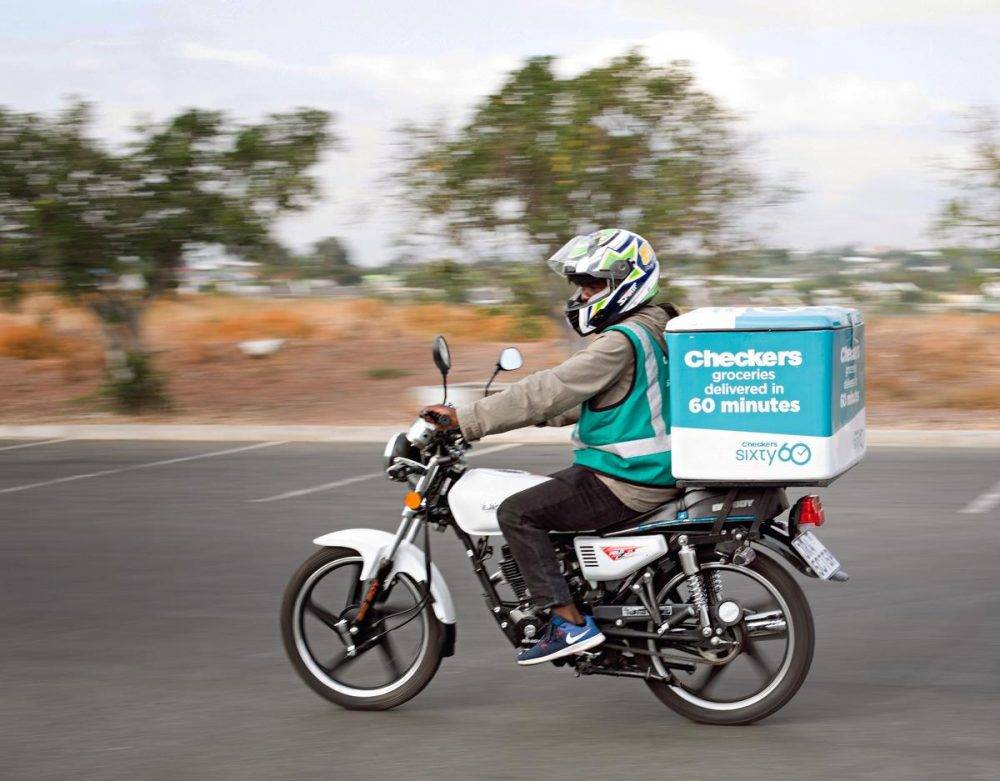
Checkers Sixty60 is now available in all SA provinces. Picture: Sourced
South Africa’s online retail sector surged 29% to R71 billion last year, and is swiftly on its way to making up a significant portion of the country’s overall retail sales.
A new study conducted by World Wide Worx in partnership with Mastercard, Peach Payment and Ask Afrika, which was released this week, forecasts that the online retail sector will break the R100 billion mark and reach 10% of overall national retail sales by 2026.
Retailers’ strategic shift towards competitive e-commerce and enhanced customer service, including the use of sophisticated AI-driven tools, has “fundamentally transformed” the local retail landscape, World Wide Worx chief executive Arthur Goldstuck said.
According to the study, Shoprite Checkers’ Sixty60 service experienced a 63.1% increase in sales in the latter half of 2023, while Pick n Pay grew its online sales by 76% and Woolworths reported a 47% online sales rise. The country’s largest online retailer, Takealot, grew sales by 6%.
Clothing (30%) and groceries (22.3%), footwear (12.6%), electronic goods (12.5%), children’s toys and games (11.7%) and medicines (11.7%) are the most purchased items online, with increased diversity in shopping choices reflecting growing consumer trust in online platforms.
Mobile phone use for online shopping passed the halfway mark (50.4%), indicating a growing preference over desktops and laptops.
Consumers aged 25 to 34 consistently led in online shopping activity (46.3%), with notable growth among people aged 65 and over from 16.4% to 24.9%. Higher socio-economic levels and living standards correlate strongly with higher online shopping activity as well as higher income and education levels, underscoring the digital divide, the study found.
This latest growth in online retail sales comes after a 35% increase to R55 billion in 2022 and growth of 39% in 2021.
The study noted that the boom in sales over the past few years could be attributable to the “pandemic dividend” because it was sparked by a huge demand for home deliveries that started in 2020 — when Covid-19 hit South Africa and the rest of the world — which saw 66% growth.
The growth was later driven by competitive e-commerce strategies implemented by major bricks and mortar retailers, with existing e-shoppers moving more of their traditional shopping to the online space, and credit card payment processing becoming more streamlined.
Goldstuck said Statistics South Africa data showed that South Africa’s retail sales were just over R1.1 trillion a year but growth had been stagnant for “many years”. But, he said, the study forecasts continued “robust growth” in the sector, partially driven by the arrival of Amazon in the local market.
“Over the past 20 years there has been a fairly stable level of growth in online retail. At the current rate online retail will reach 10% of total retail by the end of 2025 or at least 2026,” Goldstuck said.
“This is a truly significant number because when that level was reached in more mature markets like the United Kingdom and the United States, it caused tremendous excitement around online retail.
“At that level all companies realised online retail was now so critical to their strategies that it required companies to make even greater investments in some cases than traditional retail. It resulted in a massive boost in the online retail landscape which then fed further growth in the years that followed.”
Mastercard South Africa country manager Gabriel Swanepoel said the company had streamlined payment processes to make online shopping “easier and more secure”, which had increased consumer confidence and contributed to the growth.
Peach Payments chief executive Rahul Jain said a proliferation of new payment methods such as “buy now pay later” had met the evolving demands of consumers.
“In turn, this allows consumers to spend more online with greater confidence. Merchants are utilising our enterprise grade infrastructure to make their financial operations more efficient as they continue to capitalise on this growth,” Jain said.
An industry survey among retailers as part of the study showed customer service was paramount to online retail success, with 73.9% of respondents emphasising its importance.
Stock availability and having a wide range of quality products were also crucial, while competitive pricing and personalisation of offers were less important. But this is expected to change with the advent of artificial intelligence in personalising offers.
Retailers reported that the most significant operational challenges for the industry were payment failures (18.2%) and managing customer queries and complaints (16.8%).
The major issue for cart abandonment by consumers was reported to be declined credit cards (52.2%). Concerns about the security of credit card information and complicated checkout processes were also significant factors leading to abandoned carts.
 (1).png)
 8 months ago
18
8 months ago
18


















